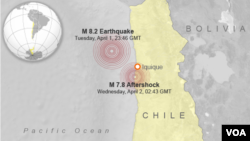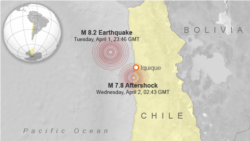From VOA Learning English, this is In The News. A powerful earthquake struck an area near the northern coast of Chile on Wednesday. The earthquake came a day after an even stronger quake hit the area. The earlier quake was blamed for at least six deaths.
The United States Geological Survey says a 7.8 magnitude aftershock hit northern Chile late Wednesday night, local time. Magnitude is a measurement of the energy released at the center, or source, of an earthquake. U.S. officials said the aftershock was centered about 23 kilometers south of the port of Iquique. They said it struck at a depth of 20 kilometers below sea level.
The aftershock led Chilean officials to order thousands of people away from coastal areas. It also led to warnings of high tsunami waves in parts of the Pacific Ocean. The orders and tsunami warnings were later canceled.
The aftershock struck a day after an even more powerful earthquake hit northern Chile. That quake was centered in an area about 100 kilometers northwest of Iquique. The city is home to nearly 200,000 people.
The quake was felt in Bolivia and Peru. It also led to tsunami warnings as far as Japan. The warnings were cancelled hours later.
Chilean police and soldiers guarded coastal communities to prevent attacks on homes and businesses. Television video showed damaged buildings in Iquique. But officials found surprisingly light damage from the quake.
President Michelle Bachelet visited the affected area. She spoke to the nation about the disaster.
She said appropriate measures have been taken to protect lives and property. And she said the government will continue to work all the time that is necessary to deal with this emergency and protect our citizens.
Rafael Abreu is a scientist with the U.S. Geological Survey Earthquake Information Center. He says the earthquake activity began with a magnitude 6.7 quake on March 16. More than 100,000 people were told to leave low-lying areas, but returned later.
Earthquakes are somewhat common in Chile. They are also a fact of life in the American state of California. Scientists say a quake of magnitude eight or higher could strike along the San Andreas Fault in coming years. The San Andreas Fault extends from north to south through California. Thousands died in its last major rupture, or movement. That took place near the city of San Francisco in 1906.
Smaller earthquakes also can be deadly if they strike close to heavily populated areas. Safety experts say every home needs to have a plan of action, supplies food and water, and emergency equipment.
Kate Hutton is a seismologist at the California Institute of Technology. She specializes in the study of earthquakes. Kate Hutton admits there is no way to predict earthquakes, so being prepared is the best defense.
We will have more about earthquakes next Tuesday on the weekly program Science in the News. And that’s In The News from VOA Learning English. I’m Mario Ritter.
We are sorry, but this feature is currently not available







